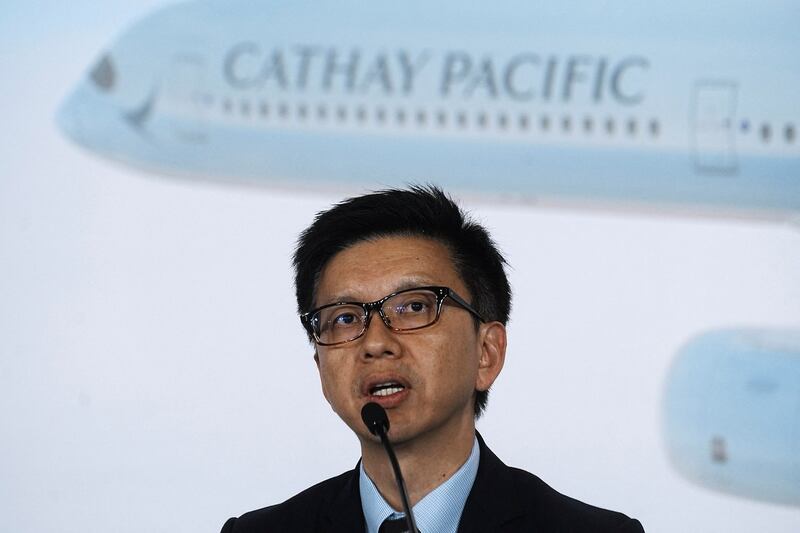Hong Kong leader John Lee on Wednesday called on the city's flagship Cathay Pacific airline to "retrain" staff after they were reported for alleged discrimination against mainland Chinese passengers on a weekend flight who couldn’t speak English or Cantonese.
Cathay said it had fired three flight attendants after a passenger complained about comments from a flight attendant on flight CX987 from Hong Kong to the southwestern Chinese city of Chengdu on Sunday.
Cathay CEO Ronald Lam said the company had carried out an internal investigation after a complaint on social media attaching a recording claiming to be of the flight crew joking about passengers who couldn't ask for a blanket in English wouldn't be given one.
"If you can't say 'blanket' in English, then you can't have one," says one flight attendant on the recording.
According to the post, an announcement also warning people to return to their seats before take-off was only made in Cantonese – and not in Mandarin, the dominant tongue on the mainland – meaning that passengers might have missed crucial safety information.
"I feel deeply indignant and disappointed that these vile remarks and actions took place on a Hong Kong flight," Lee told the opening ceremony of Hong Kong-Guangdong Cooperation Week in the southern city of Guangzhou.
"These disrespectful remarks and actions have hurt the feelings of both Hong Kong and mainland compatriots, and damaged Hong Kong's reputation for being respectful, courteous and inclusive," Lee said in comments reported by government broadcaster Radio Television Hong Kong.
Lee's comments came after the airline was denounced by the People's Daily, the official paper of the ruling Chinese Communist Party.
"Cathay Pacific has issued an apology, saying that it has suspended the flight missions of the flight attendants and immediately launched an internal investigation," the paper said in a recent commentary. "However, responsibility for the incident obviously cannot just be shifted to the small number of employees involved."
"What Cathay Pacific needs to reflect on is its own management system and corporate culture."
‘Sense of superiority’
The opinion article said the airline was founded by foreigners with British roots, and had "an inexplicable sense of superiority" over mainland Chinese.
"In Hong Kong, China, the countercurrent of worshiping English and looking down on Mandarin will soon be lost in the tide of history," the paper said.

Lee called on Cathay to take prompt action to rebuild its public image following the incident, including reviewing its staff training program.
Lam had earlier said: "Cathay Pacific takes a 'zero tolerance' approach to serious violations of company rules and ethics by individual employees and will not tolerate them," Lam said.
He pledged to lead a task force in a total review of service processes and staff training.
"We must ensure that all Cathay Pacific staff respect passengers from different backgrounds and cultures and provide professional and consistent service in all areas served," Lam said.
Hong Kong Secretary for Transport and Logistics Lam Sai-hung said he was "deeply saddened by the inappropriate remarks made by some crew members" at Cathay Pacific.
"I hope that the review will be completed as soon as possible, and can fundamentally improve the company's system and employee attitudes negative to Hong Kong's reputation as an international aviation hub and a city of hospitality," he said.
‘Decolonized’
The row shows that Beijing is keen to stamp out the legacy of foreign influence in Hong Kong, said current affairs commentator Sang Pu.
"This whole thing has been escalated to show how Hong Kong hasn't been properly decolonized, and how it's still dancing to Britain's tune, by remaining nostalgic for English and Cantonese [rather than Mandarin]," Sang said.
"They are using it to show that Hong Kongers are incapable of respecting non-Cantonese Chinese, particularly mainlanders," he said. "They are escalating it by bringing out the big guns, so people in Hong Kong will be intimidated and then 're-educated' to be more obedient."
"They've made this tiny incident an excuse to target all Hong Kongers, claiming that they're insufficiently decolonized," Sang said. "[They want] Hong Kongers to install their own miniature party committee in their own heads, and then self-censor all of their speech and actions."
Beijing has blamed the 2019 protests and other recent pro-democracy movements in Hong Kong on " hostile foreign forces" trying to foment a revolution in the city, imposing a draconian national security law on Hong Kong in 2020 that criminalizes criticism of the authorities.
In October 2022, social media platform Douyin pulled the plug on a live-stream host broadcasting in Cantonese, a regional Chinese language that is also the lingua franca of Hong Kong.
In 2010, thousands of people took part in mass protests in Guangzhou in support of the Cantonese language after a mainland Chinese political body called for cuts in Cantonese-language broadcasts.
However, fewer recent migrants to Hong Kong are now able to speak Cantonese, amid fears that a growing emphasis on Mandarin could threaten the city's indigenous culture.
Translated by Luisetta Mudie. Edited by Malcolm Foster.
